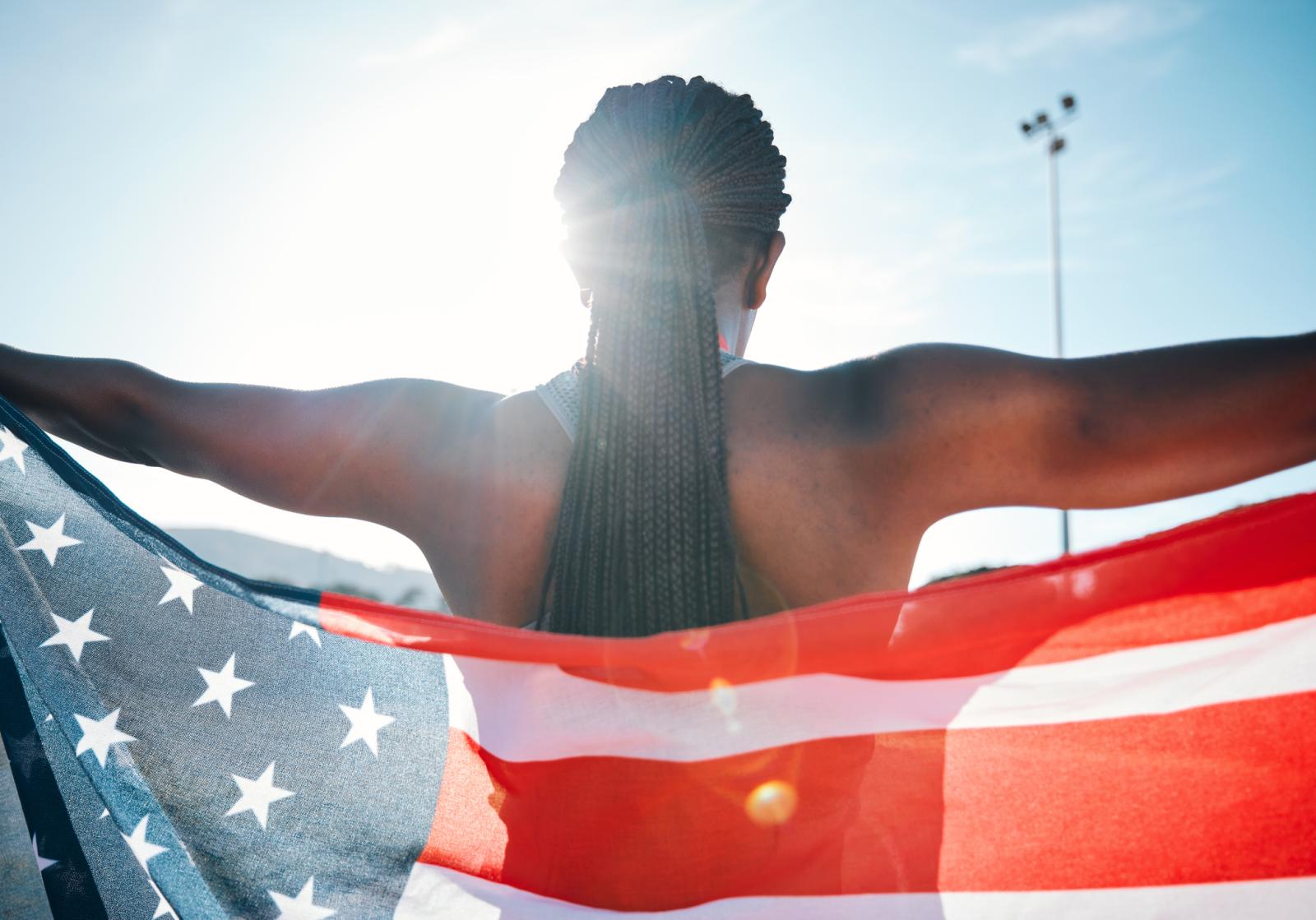Black Americans and others from across the African Diaspora have delivered some of the most iconic performances in the history of the modern Olympic Games.
Unfortunately, this group remains underrepresented in the overall athlete count: of the 11,417 athletes who participated in the 2020 Olympics, it is estimated that only roughly 10% were of African descent, many of whom participated in basketball, gymnastics, or the popular track and field events.
While these present-day figures seem stark, there has been an undeniable increase in Black participation since the days of Jesse Owens and Wilma Rudolph. In recent years, Howard University has produced several Olympic-level athletes in sports ranging from track to swimming to taekwondo, contributing to the uptick in representation. Even more, today’s Bison are expanding their interests to other Olympic sports such as rugby, golf, and judo, developing new potential pipelines for Black participation at what is globally considered the pinnacle of athletic competition.
As the 2024 Paris Olympics approach this summer, Howard’s own Olympians and coaches share what it’s like to represent the African diaspora in the world’s biggest athletic spotlight, and what it takes to get Black athletes there.
Percentage of the 11,417 Olympic athletes in 2020 who were of African descent
10%
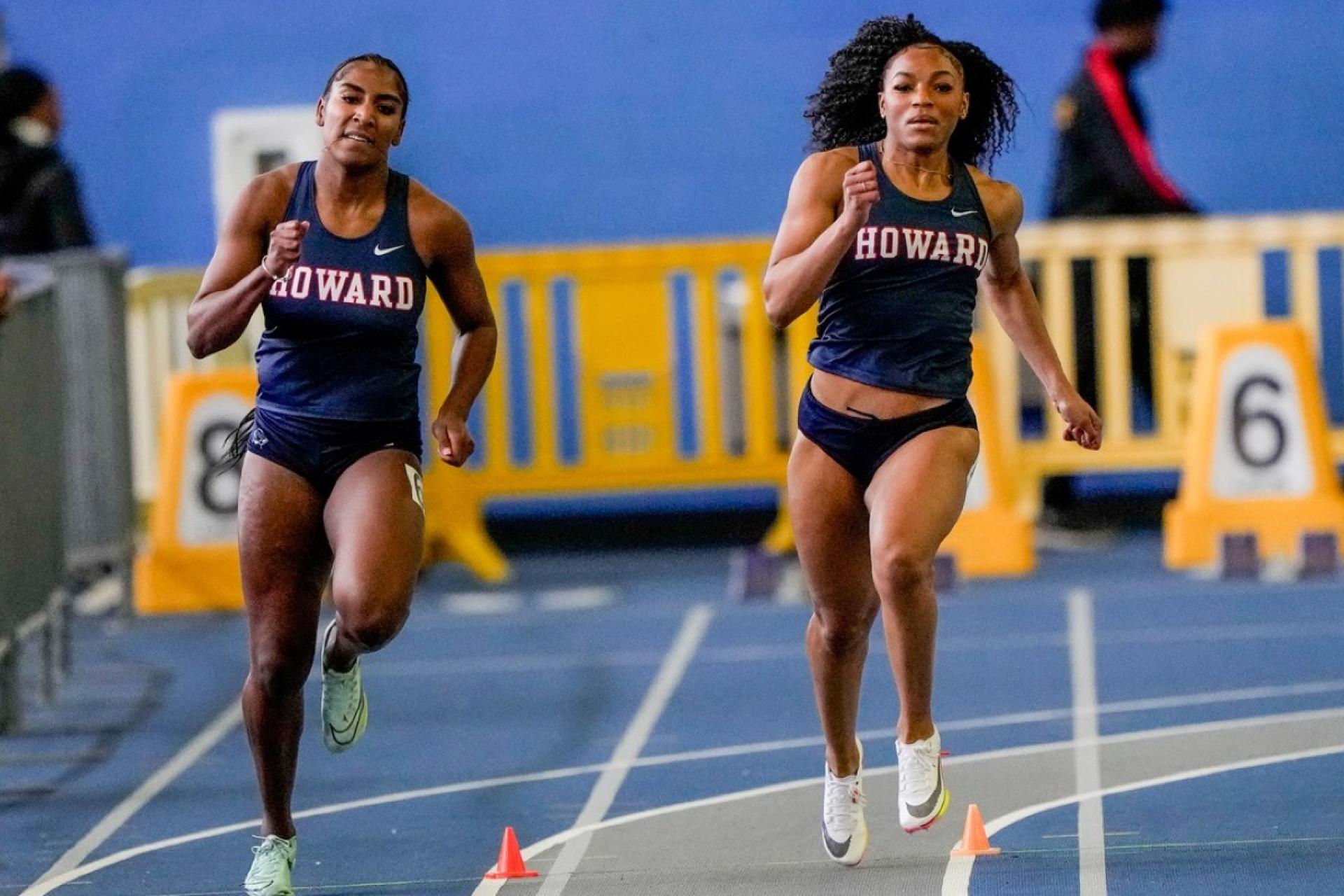
Howard track runners Mackenzie Robinson and Tiffani-Rae Pittman
Track and Field
Despite his track and field pedigree, David Oliver (BBA ’04) says he never aspired to follow in his mother Brenda Chambers’ footsteps into the sport, only starting toward the end of his high school career – and mostly as additional conditioning for football. He soon discovered a talent for hurdling, however, earning an athletic scholarship to Howard University and embarking on a decorated career that would lead him to the 2008 Summer Olympics in Beijing, China, where he earned a bronze medal in the 110-meter hurdles.
Oliver’s drive and determination were evident from the moment he arrived on campus. “I spent all the time in the world in [the coaches’] office, asking questions, figuring things out,” Oliver says. “I would do individual practice in the middle of the day, and then go to team practice at 4:00 [p.m.], just because I was like this is clearly what I’ve got to do. Just whatever it takes to get the job done, no excuses.”
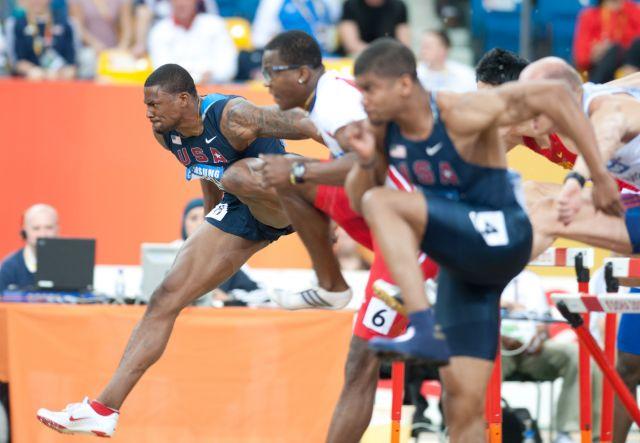
Upon retiring from professional competition in 2017, Oliver agreed to become the director of Howard’s track and field program and has led its resurgence into a conference powerhouse. Two of his athletes, 2022 graduate Jessika Gbai and 2023 graduate Jessica Wright, are in contention to qualify for this summer’s Olympics. Oliver knows firsthand the mentality and attitude required, and he sees that same ambition in his star pupils. “You don’t make it this far, not even on the college level, without having that,” he says. “I just try to make sure they believe they’re the baddest person on the planet when they show up.”
With Howard’s track and field program competitive once again at the conference level, Oliver now has eyes on national championships, unsurprising for someone who has experienced the highest summits the sport has to offer. “To be one of the most dominant programs that exists – that’s the ultimate goal,” he says. “We’ve become that conference-wise, but that’s not enough. We need to move to the next level.”
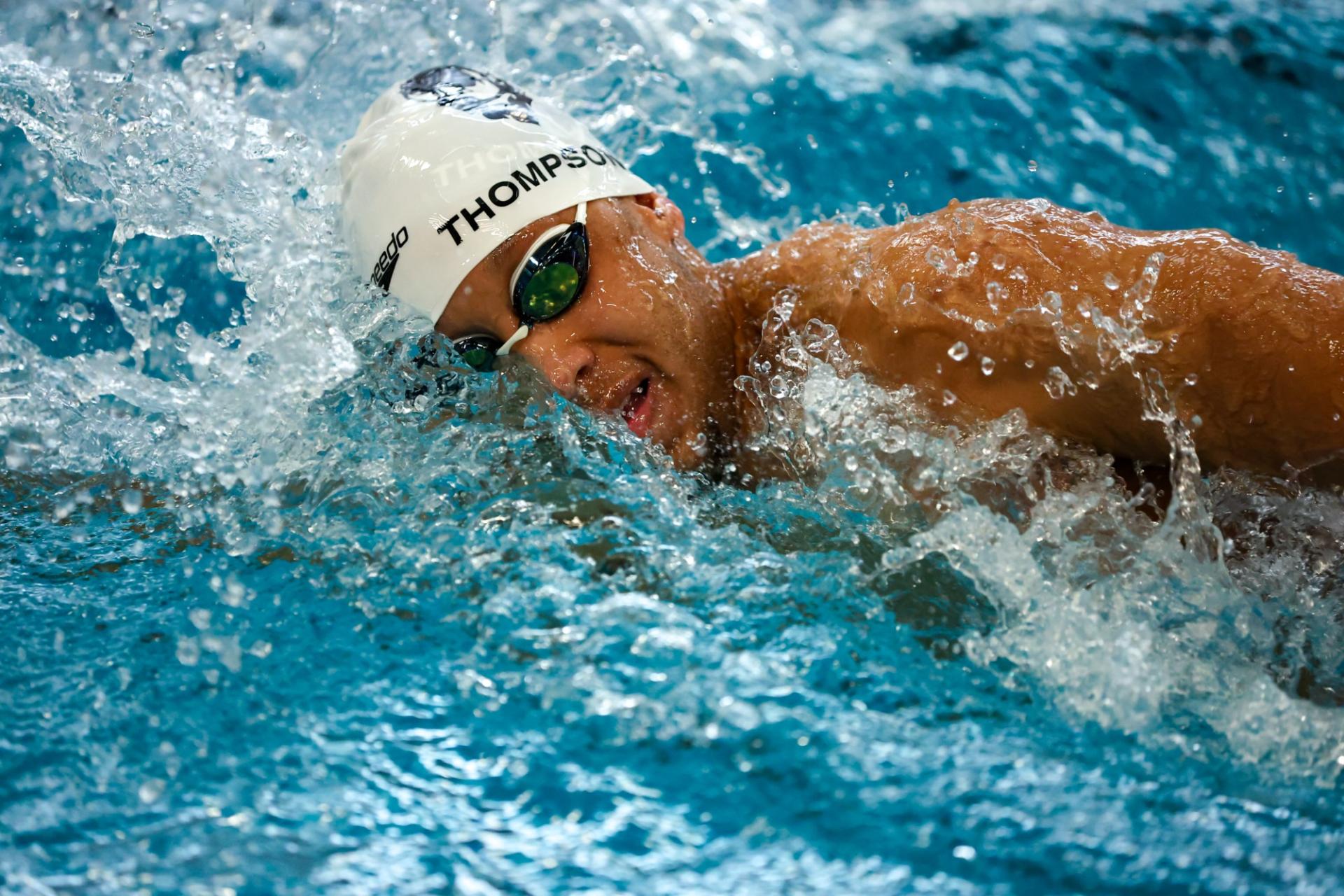
Howard swimmer Luke Kennedy Thompson
Swimming and Diving
After Howard Magazine showcased the University’s swimming and diving team in 2022, Sports Illustrated also featured the team – the only HBCU swimming and diving program in the country. For program director Nicholas Askew (BS ’00), the positive promotion was the byproduct of years of hard work.
“We received that publicity not because of something that happened overnight,” Askew says. “Over the past two years, what we’ve been able to see is a global impact that is centered around a lot of the things our program has been doing over time.”
As a fledgling swimmer in his youth, Askew perceived the dwindling number of Black participants as the level of competition increased. He says the reasons behind the dearth of swimmers of colors, particularly within the United States, has a historical significance.
“A bigger issue is the systematic oppression, as well as the ugly history that Black and Brown people have had with water spaces,” Askew says, pointing to evidence such as the transatlantic slave trade of the 17th and 18th centuries and the policies borne out of Jim Crow segregation to highlight how Black people have been disincentivized from participating in aquatics. “Those are the bigger underlying issues where we see less people of color participating, and additionally why we see so many less Black and Brown people who have limited or no swimming ability.”
Proportion of all people of color in NCAA competitive swimming and diving who are Howard University students.
1/3
Nearly one-third of all the people of color in all of NCAA competitive swimming and diving are students at Howard University. Askew and his staff pursue the top recruits each year, swimmers and divers with the talent to excel at any of the country’s top collegiate institutions. “When we’re looking at recruits, we’re looking at the highest-level swimmers and divers who we can find, or who find us,” Askew says. “We’re here trying to compete against those top programs.”
Many of those top programs also send their swimmers and divers to international competitions like the Olympic Games, a feat Howard has accomplished before – and one Askew believes can be done again.
“We have a history of sending swimmers to the Olympics, and that’s one of our highest goals, because it’s one of the most difficult things to do in all of competitive sport,” Askew says. “[Olympic berths] are very special, especially given the competitiveness of the United States. Even making an international team is very difficult.”
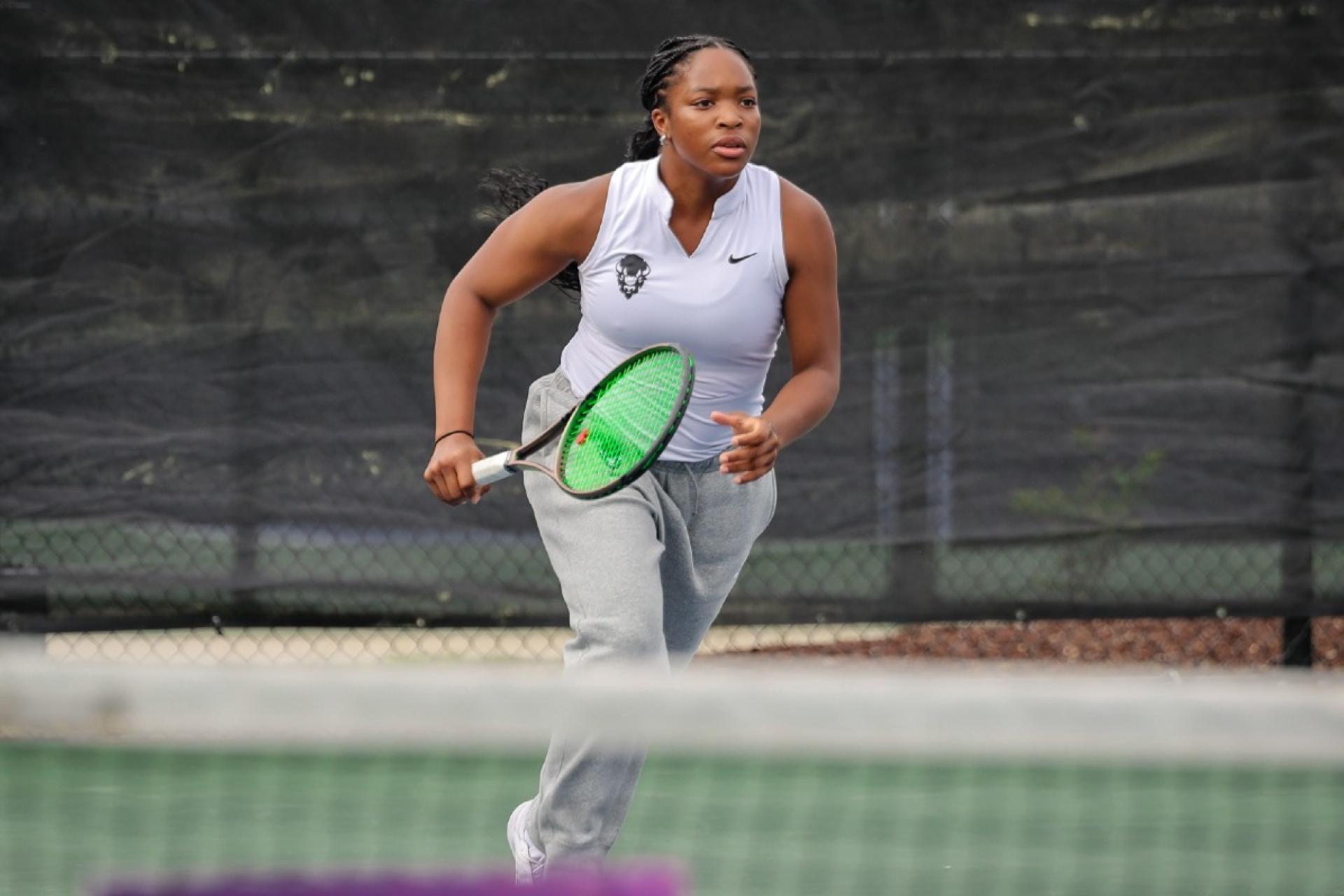
Howard University tennis player Imani Jean closes out rookie campaign with a singles win against Delaware State.
Tennis
Also the coach of the University’s tennis program, Askew likewise noticed while growing up the lack of representation in the sport as he navigated its ranks. Outside his father’s group of friends – and aside from the memories of Arthur Ashe, who retired from tennis in 1980 – Askew saw nobody playing the game to whom he could relate.
“When you’re looking at that age on TV, or any kind of periodical, I didn’t see anyone that I saw myself in, to a great extent,” Askew says. “For me, growing up, it was more Pete Sampras, Andre Agassi, Jim Courier that I started to watch.”
Because of tennis’ global nature, most colleges and universities accommodate tennis programs, which provided Askew and his Howard teammates the opportunity to compete against HBCUs and predominately white institutions. The differences he observed were glaring.
“There was a pretty big disparity at the playing level, especially at the HBCUs,” he says. “Similar to swimming, it was two-fold: the really good players could go almost anywhere in the country and play for a team, and then there was also a limited pool of players. Oftentimes, it would be difficult to fill a roster for a lot of HBCU teams.”
These days, tennis is experiencing a boost in racial diversity, with the United States Tennis Association reporting in 2023 a 46% increase of Black and African participation over a three-year period, or roughly 2.3 million people. That same year, four Black American players reached the quarterfinals of the U.S. Open for the first time in the tournament’s history. All four – Coco Gauff, Madison Keys, Ben Shelton, and Frances Tiafoe – are in contention to compete at this summer’s Olympics.
Certain limitations persist, but Askew remains optimistic about the future of Howard tennis. “We’ve had players who have been out there on the pro tour, and have been able to do okay,” Askew said. “As we continue to pool more resources and support for the program, something like the Olympics can become more of a reality. I know we have the type of platform that it can happen.”
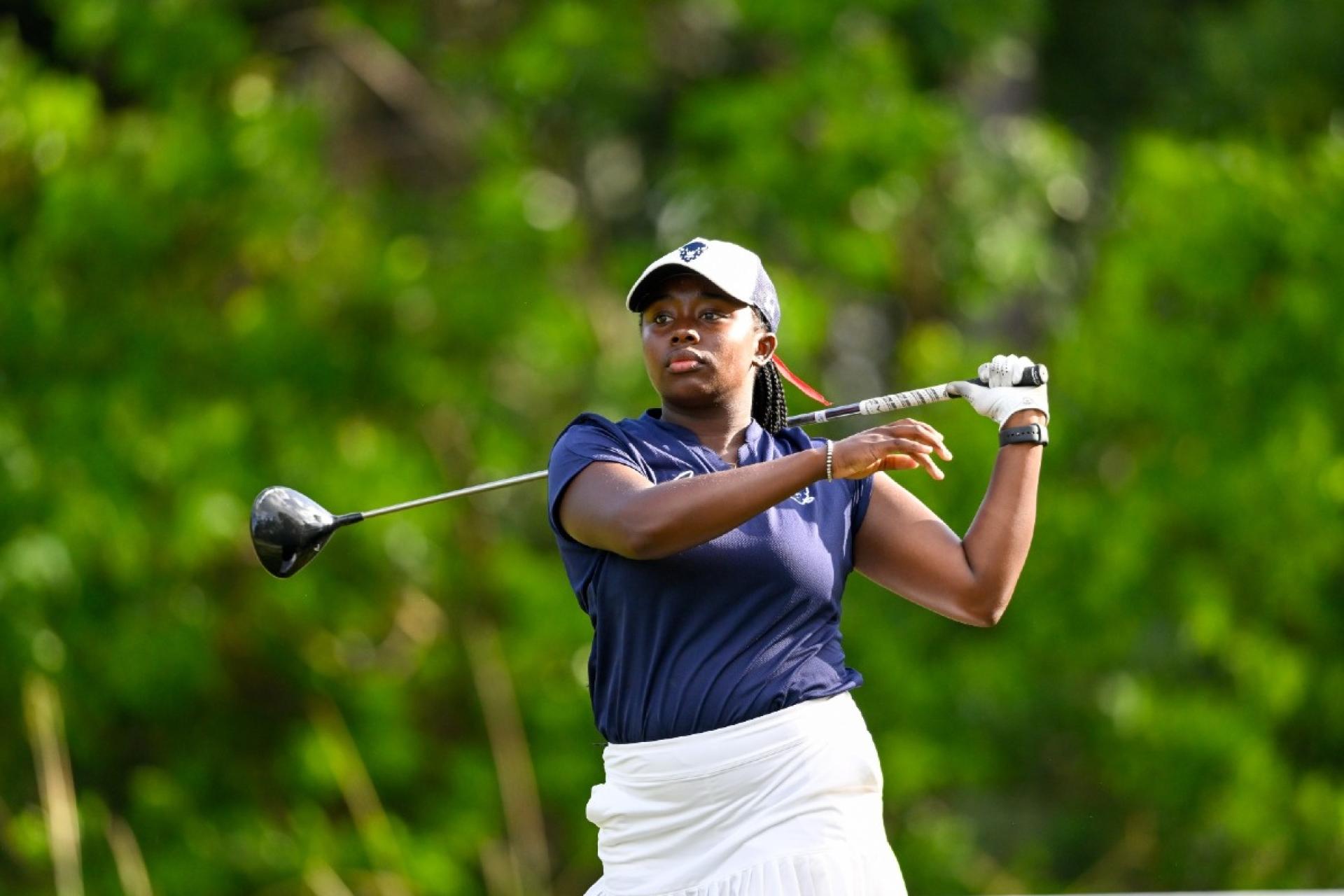
Howard golfer Jada Richardson
Golf
Samuel Puryear, Jr. was clear in his vision for Howard’s golf program when he agreed to become its director in 2020. “I wanted to be able to be a conduit for young, Brown people and give them a chance,” he says. “Because of my experience in the mainstream golf world and seeing the best that golf has to offer, I wanted to show these young people what golf could look like if they did their part.”
Since its creation, the club has flourished under Puryear’s stewardship, winning the Mid-Eastern Atlantic Conference (MEAC) championship, consecutive PGA Tour Works collegiate championships (recognized as the de facto HBCU national championships) and this year's Northeast Conference (NEC) championship, in the process earning its very first appearance in the NCAA Division I regionals. The team also starred in “Why Not Us,” a 2023 ESPN+ miniseries chronicling the challenges and victories of this groundbreaking program.
Puryear gladly credits the early success to the initiative of his players. “Three of my freshmen said, ‘Hey Coach, our goal is to try and win three more NEC championships,’ and it caught me off-guard,” he recalls. “In the past, I’m the only one that’s thinking big like that. Now that I know I have the youngest that are thinking how I’m thinking, I know now I can push them, put resources around them, and try to help acclimate them to things that will help them be great.”
According to the National Golf Association, 4.1 million African Americans played golf in the United States in 2021, a significant increase from the 2.6 million who played golf in 2011. Despite this growth, Black golfers remain an anomaly in the sport, with figures such as Tiger Woods serving as the exception that only proves the rule. Zero Black golfers are currently projected to qualify for participation in the 2024 Summer Olympics.
But, inspired by past Howard Olympians such as Oliver, Puryear sees no reason why a Howard-trained golfer could not one day qualify for – and medal at – the Olympic Games. “Whenever I go into the office, I run into Coach Oliver, so I know it’s possible,” Puryear says. “Like our show’s title: why not us? Why can’t it happen in golf?”
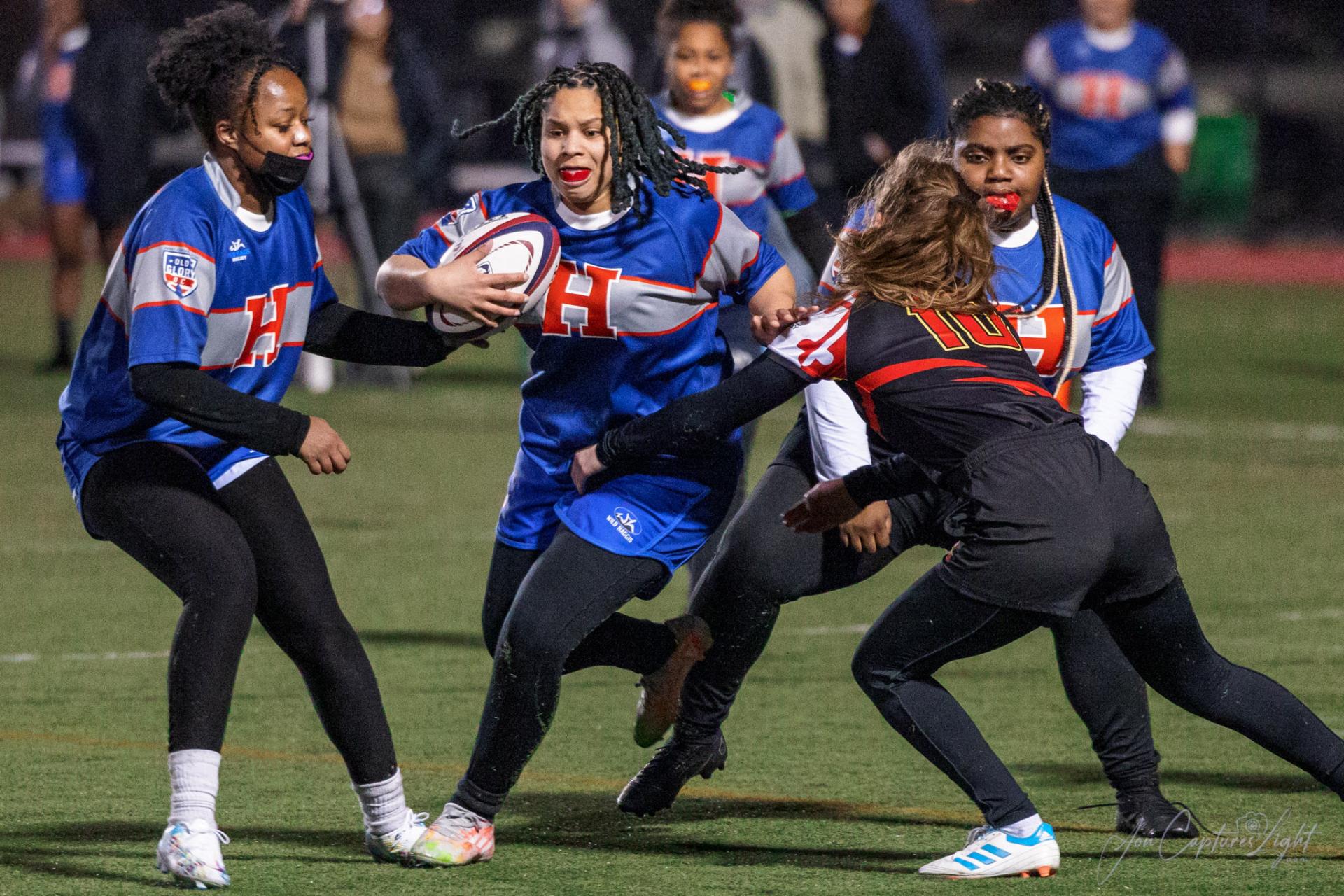
Howard women's club rugby team. Photo by Jonathan Musselwhite
Rugby
As an incoming first-year student in 2020, Tavaris West (BBA ’24) was excited to chance upon a Twitter post announcing the launch of an official rugby club at Howard University.
West initially took to the sport as a freshman at his predominantly white, Catholic high school. “Immediately, that first year, I fell in love with the game,” West says. “It was everything I played – football, soccer, wrestling – all into one sport. I really enjoyed it.”
Unfortunately, the COVID-19 pandemic effectively cancelled West’s final high school rugby season, forcing what he believed was an abrupt end to his athletic career. That initial social media post, however, provided renewed hope.
“Immediately, I retweeted the post and posted a clip of me scoring in high school – like, okay, now I get to play at the collegiate level,” West says. “That was really needed for me, especially coming off the COVID year, not getting my senior year of rugby in high school. I was like, ‘Okay, now I’m still not done with this sport and it’s here at my HBCU.’ I jumped right into it, and I’ve been a part of the team since its very first day.”
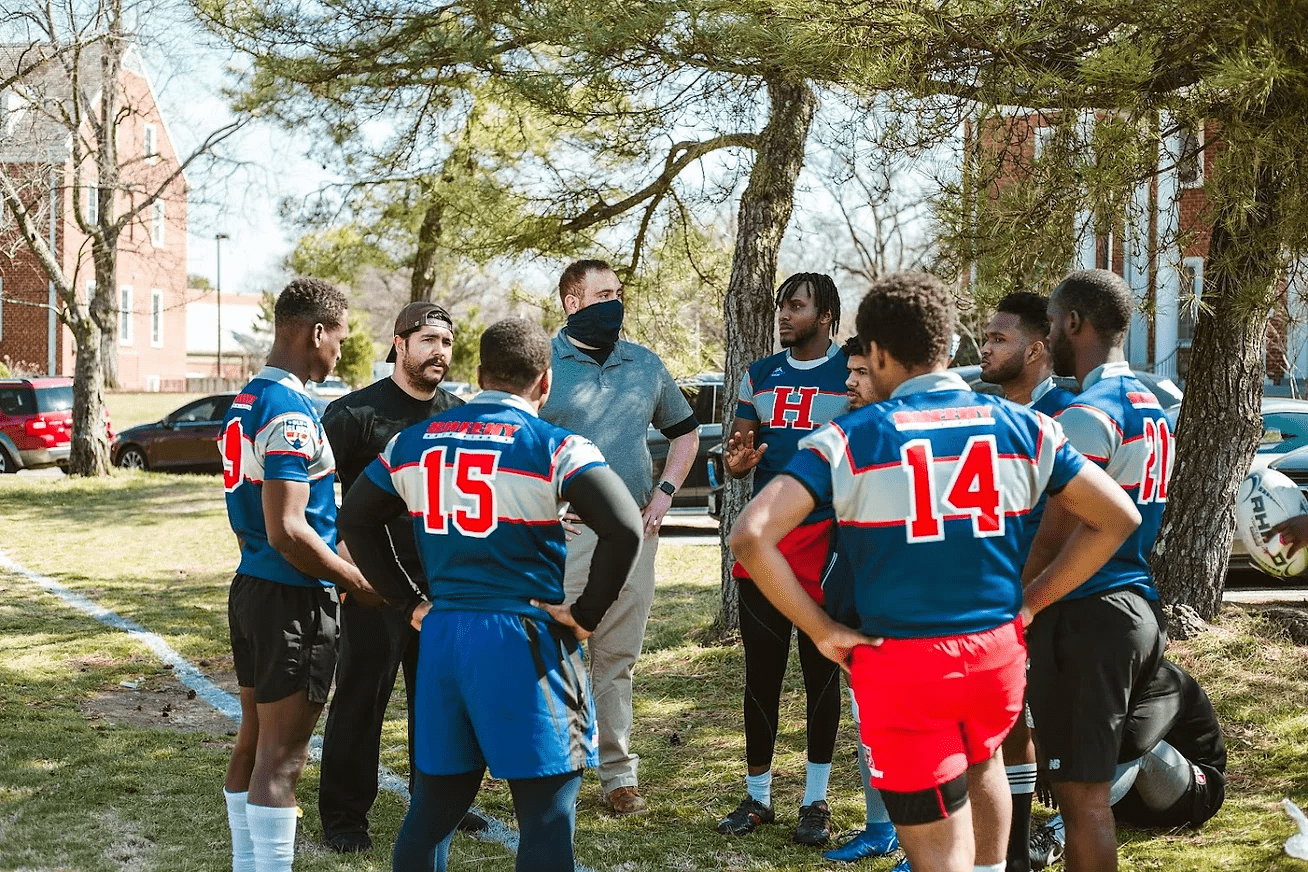
For West, a founding member and former vice president of Herd Rugby, the team’s growth over these four years has been unmistakable. After rostering only eight student-athletes its inaugural year, the club doubled in size the next, a boon to the team’s competitive capacity. This year, the team secured the Mid Atlantic Rugby Conference championship in the small college division, thereby qualifying for their first National Collegiate Rugby championship tournament.
The rapid success hasn’t been confined to just the men, either. In 2023, Howard Women’s+ Rugby became the first HBCU rugby team to compete in the College Rugby Association of America’s Division II women’s championship game, finishing second overall in the nation.
Despite rugby’s history of racial diversity, anxieties regarding minority underrepresentation in the sport have recently resurfaced. Per a 2020 article in The Guardian, less than 8% of players in the community game identify as Black, Asian, or minority ethnic according to the Rugby Football League; when you consider solely Black players, the number is even lower. Howard is one of few HBCUs to house a rugby program, but West believes the sky is the limit for any student-athletes who choose to pursue rugby at an institution like The Mecca.
“Especially being a founder, I would always echo that our achievements now aren’t really for us – they’re for the generations to come,” West said. “If we set a good foundation, it can only build and flourish from here.”
Rhadi Ferguson competing in judo at the 2004 Olympic Games.
Judo
While watching the 1996 Summer Olympics’ judo competitions with his mother, Rhadi Ferguson, PhD (BS ’97, MEd ’02) made a declaration to her almost too bold to be believed.
“I said, ‘I’m going to the Olympics, Mom.’”
“She was like, ‘Yeah, right.’”
Ferguson began training in judo at age 6 around his hometown of Miami, fascinated by the artform after witnessing it during an after-school program. “When I was that young, I just used to like fighting, to be honest,” he laughs. “As I’ve gotten older, I understand that fighting damages both people, so some fights just aren’t worth it.”
That level of confidence came to define Ferguson’s athletic career at The Mecca. Ferguson arrived at Howard University in 1992 on a football scholarship but would graduate in 1997 as a three-sport athlete, joining the wrestling and track and field teams all while earning a bachelor of science in mechanical engineering. He likewise joined the wrestling program on account of his audacity: he one day declared his desire to wrestle, pinned the team’s starting heavyweight twice as a tryout, and was himself declared the team’s new starting heavyweight by the coaching staff ahead of their competitions the following weekend.
I left Howard as still a green belt in 1997 – and made the Olympics in 2004.”
Post-graduation, Ferguson pursued professional football, but after those prospects dwindled, he accepted a position at Texas Instruments that placed him within an hour of Jimmy Pedro, the American judoka Ferguson watched during the 1996 Olympics. “I used to get in my car and train with Jimmy,” he says. “I left Howard as still a green belt in 1997 – and made the Olympics in 2004.”
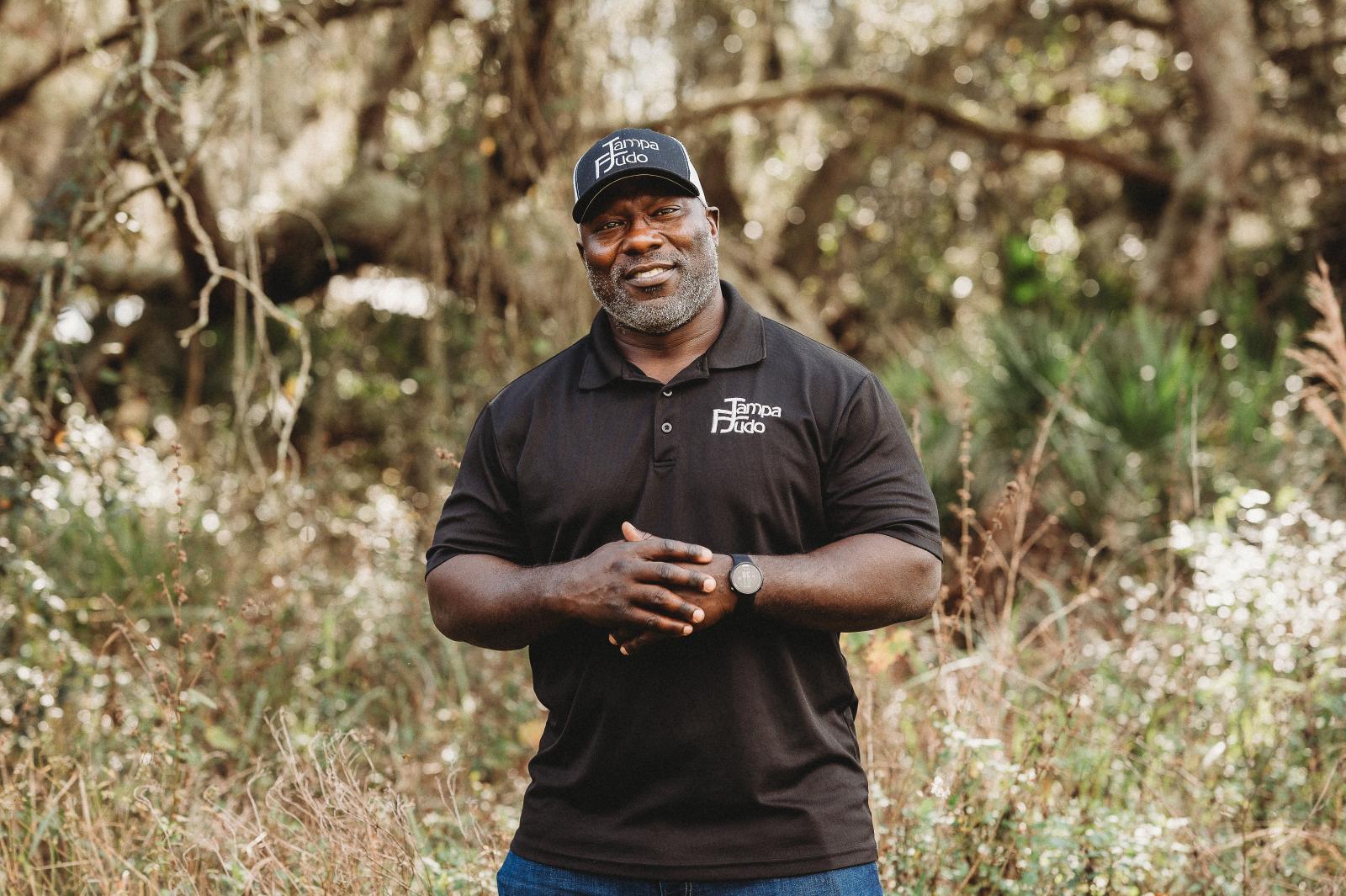
Ferguson indeed competed in judo at the 2004 Summer Olympics in Athens, Greece, in the half-heavyweight division. He cites his coaches and mentors as indispensable toward his development into an Olympic-level athlete. “The educational development, the personal development that I needed and what I received from Howard University is unmatched,” Ferguson says. “I think that, unfortunately, we sell some of these wonderful students of color and Black students into going elsewhere instead of bringing their talents back home.”
Ferguson is presently instructing an elementary judo course at Howard as an adjunct professor, and his goals for the future are high, incorporating everything from a new advanced judo class to a judo team and an on-campus grappling club. His son, Rufus II, has also committed to join the University's football team this fall.
“Although I never did a single day of judo at Howard University, what I did at Howard University helped me become a judoka, an Olympian, and a world-class athlete, 100%.”
Article ID: 2156
Keep Reading
-
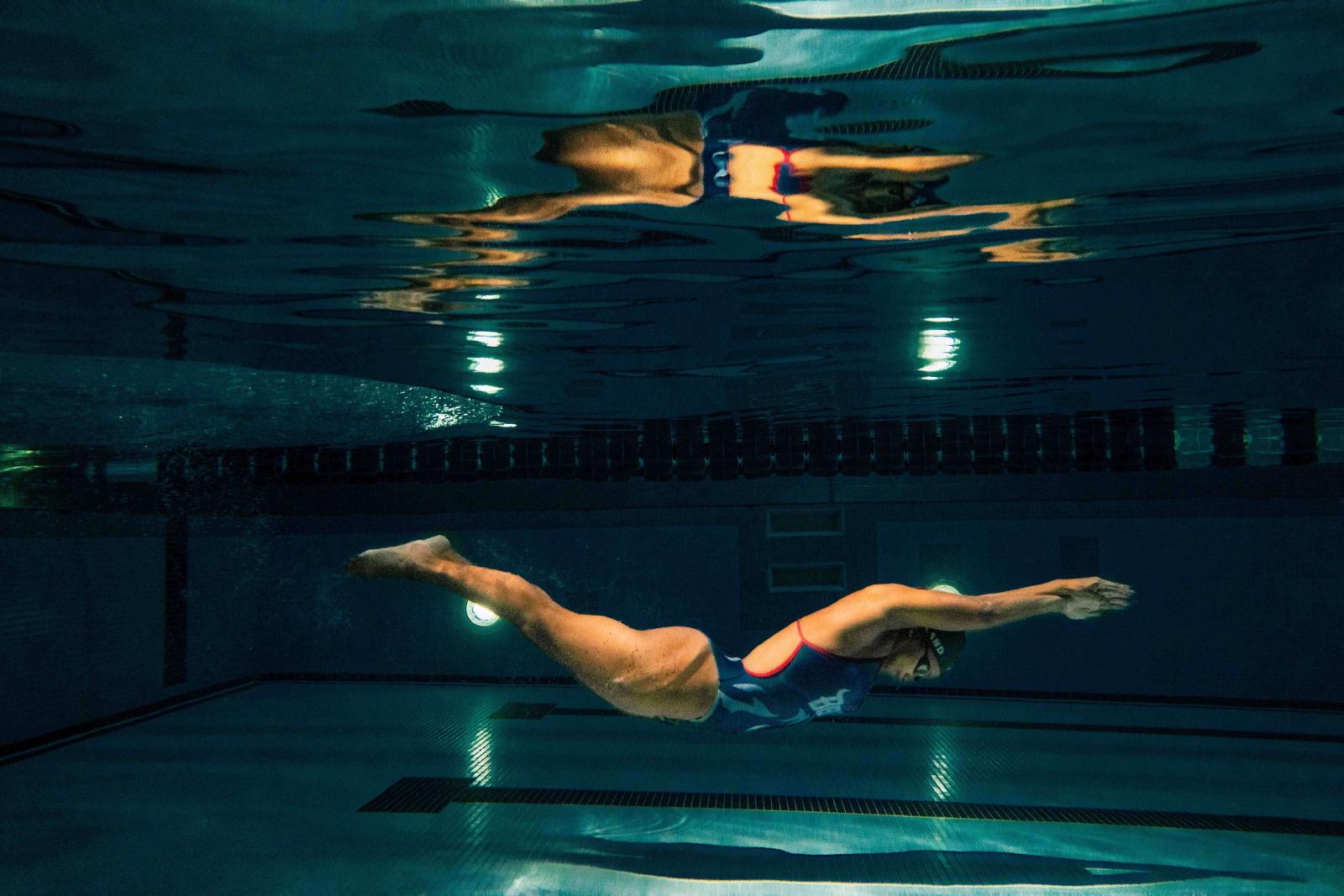
Making Waves
Howard University is the only HBCU left with a Division I swimming and diving program, leaving the team with a responsibility to do more than just win competitions —it has to win over more African Americans to the sport.
-
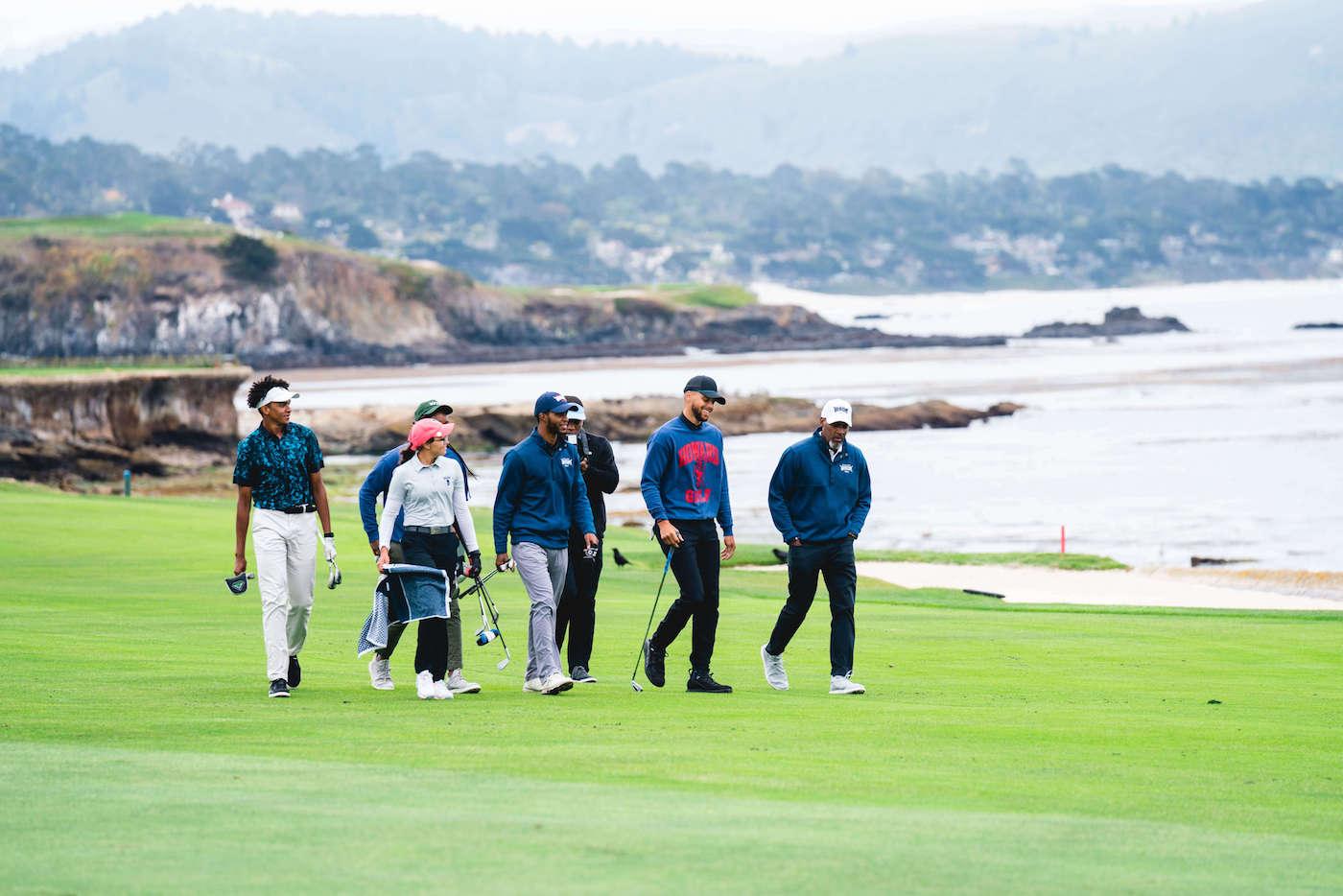
Athlete Ambassadors
Howard's first Division I men's and women's golf team remember the history of the sport as they work to make its future more diverse and inclusive.
-
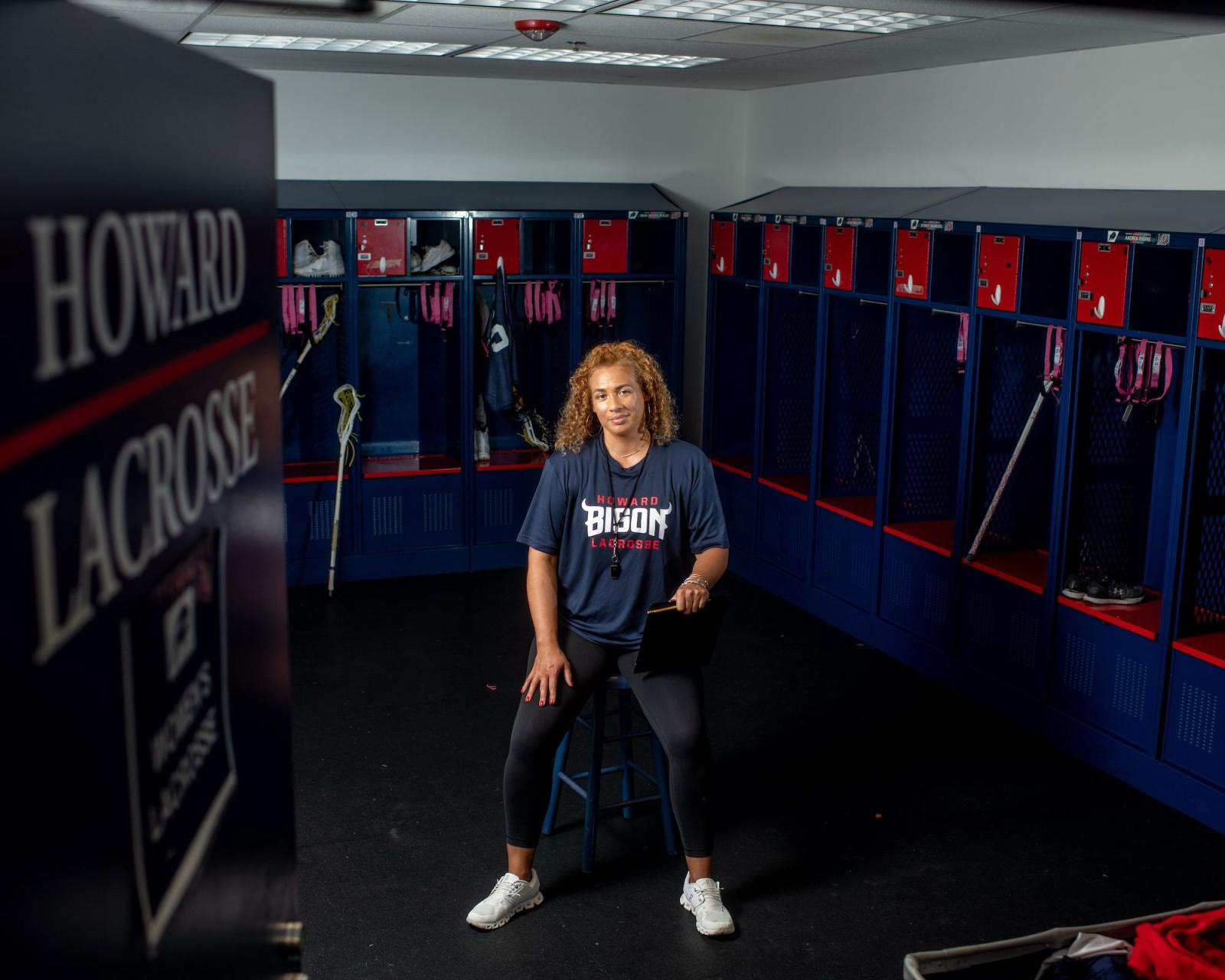
Title IX and the Black Female Athlete
On the 50th anniversary of Title IX, women athletes of color still face challenges.




